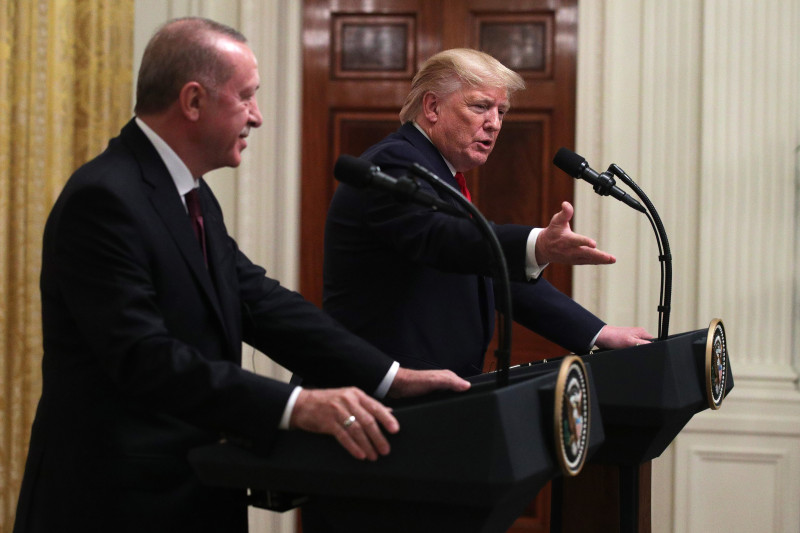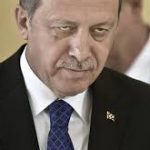The benefits of their personal relationship are clear for the Turkish president. But the U.S. president has his reasons, too.
That was it? What am I missing? It has been a few days since President Donald Trump hosted his Turkish counterpart, President Recep Tayyip Erdogan, at the White House, and I am still trying to figure out why the meeting happened.
For all the buildup surrounding the encounter, including two lopsided votes in the House of Representatives recognizing the mass murder of Armenians in 1915 as genocide and authorizing sanctions on Ankara for its October invasion of Syria, the meeting was a letdown for all involved. Almost everything Trump and Erdogan discussed at their joint press conference last Wednesday afternoon fell into the category of either “ongoing challenges” or “future aspiration.” Perhaps it was enough for the two leaders to put their obvious mutual affection on public display, but that only momentarily papered over what has been a long and painful deterioration of relations between once strong allies.
Then again, this meeting was not actually about substance. It was about politics. And on that level, both men won.
The results were otherwise meager given the apparent stakes involved, though both men can claim some tangible policy wins. Trump secured the release of Serkan Golge, a Turkish American scientist who had been detained since the crackdown following the coup attempt in July 2016. He was accused of working for the CIA, but this was a spurious charge. Golge was a hostage. Kudos to the president for once again winning the release of an American citizen like he did with Andrew Brunson (also held by Turkey in the aftermath of the failed coup), though Trump marred his own achievement with the obsequious gratitude he heaped on Golge’s jailer.
For his part, Erdogan stood next the U.S. president in the White House as the American leader repeated, almost verbatim, the Turkish government’s talking points on Operation Peace Spring—what Ankara calls its invasion of Syria. Trump made the case that Turkey is fighting terrorism just like the United States fights terrorism and that Ankara had taken on the Islamic State directly. Of course, this overlooks the fact that in 2014, Ankara told then-President Barack Obama that it would not take on Abu Bakr al-Baghdadi’s forces because the U.S. strategy did not include regime change in Syria. It also ignores the fact that the lead elements of Turkey’s recent military operations, what the Turks call the Syrian National Army, are composed of a variety of militias, including extremist groups. The full-throated American endorsement of Turkey’s Syria policy may have been in and of itself worth the visit for Erdogan, but he also received a commitment from five Republican senators who joined the Turkish president and Trump in the Oval Office that the Senate would not recognize the Armenian genocide. The same evening, Sen. Lindsey Graham, alternately an advocate for and critic of Turkey, dutifully blocked consideration of the legislation.
Both Syria and the Armenian genocide were important and politically salient for Erdogan, but on the core issues that divide the United States and Turkey, he got nowhere. The Turkish delegation was clearly hoping to find some workaround regarding the S-400—the Russian air defense system that Turkey began taking delivery of last summer—that would head off congressionally mandated sanctions. Indicating that the two countries remain at odds, Trump called the issue a “serious challenge,” though he committed his administration to continuing dialogue with Turkey over the issue, which may be enough to stave off Congress for the moment. In addition, because there is no resolution to the S-400 problem, Turkey will not be readmitted to the F-35 Joint Strike Fighter program, which is not just a national security issue for Ankara but also an economic one. Turkish manufacturers make a variety of components for the plane, and Turkey was intended to be a regional service depot for it. Expulsion from the program means that
those defense dollars will go somewhere else.
Then there is the ongoing saga of Fethullah Gulen. By his own admission, Erdogan was unable to make any headway on the extradition of the Pennsylvania-based cleric whom he blames for the failed July 2016 coup. This is an issue that united Turks across the political spectrum, but without evidence of Gulen’s culpability for the attempted overthrow, he will likely remain in his compound in the Poconos. It was notable that in the press conference, there was no mention of Halkbank, a Turkish state-controlled bank that was recently indicted in the United States over its role in helping Iran to evade sanctions. Erdogan has previously sought to make the issue—believed to be the biggest sanctions-busting scheme ever—go away given how legal action and potential fines would likely adversely affect the Turkish banking sector and the economy more broadly. Perhaps Trump’s commitment to negotiating a free trade agreement between the two countries ameliorated the economic concerns associated with the prosecution, but while Erdogan can take solace in the fact that Trump seems interested in helping the Turkish economy as opposed to his previous threat to “totally destroy” it, the Turkish leader must know trade agreements run right through Congress—a place where he is decidedly unpopular.
So all in all, not much has changed: The S-400, F-35, and Gulen continue to divide the two countries, and Trump approves of Turkey’s invasion of Syria. How is this different from Nov. 12, the day before the meeting? It isn’t—at least on the substance.
Optics and politics are another story, however. Here, one has to give the advantage to Erdogan. The whole episode—the visit, the effusively warm way the president characterized bilateral relations, the White House’s reluctance to punish Turkey even if it does not let Ankara off the hook on a variety of issues—has raised questions among analysts about the apparent hold the Turkish leader has on Trump. Erdogan clearly benefits from this reputation for compelling Trump’s deference.
There is speculation that Trump’s shows of respect to Erdogan are related to his business interests in Turkey. Others suspect that the president has become convinced that Turkey can be helpful against Iran. He also has a well-known yen for strongmen. But sometimes the best reason is the most straightforward. Trump is facing impeachment and reelection. He famously campaigned on getting out of the Middle East. Erdogan’s invasion of Syria has effectively relieved the United States of responsibility for northeastern Syria. That is a political win for Trump, who declared that Turkey’s military action, and the simultaneous U.S. redeployment, was ending the so-called “forever wars,” an issue popular well beyond the president’s core supporters. That alone makes it worthwhile hosting his pal Erdogan at the White House.
By: Steven A. Cook
Source: FP



